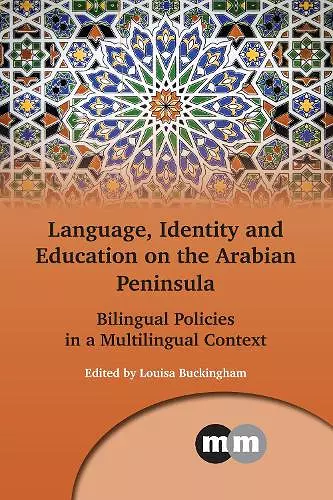Language, Identity and Education on the Arabian Peninsula
Bilingual Policies in a Multilingual Context
Format:Hardback
Publisher:Channel View Publications Ltd
Published:29th Nov '16
Currently unavailable, our supplier has not provided us a restock date

Bilingualism and multilingualism are evolving linguistic, cultural and especially educational phenomena of the modern day Arabian Peninsula. As rightly put by the editor, this region represents complex and multi-layered societies. In this book the editor and the authors capture these linguistic complexities offering an in-depth analysis of the increasingly powerful position of English in society at large and at universities. The book is a timely work and is applauded for tackling the thorny issues of EMI, identity, language and educational policies. Salah Troudi, University of Exeter, UK Language, Identity and Education on the Arabian Peninsula brings together a refreshing variety of methodologies to illuminate how different stakeholders perceive English, Arabic and other languages in relation to their own lives. The rich range of 'insider' data in the book and the focus on curricular and social context make a valuable contribution to the literature on this region, with implications for other parts of the world where English is similarly embraced and contested. David M. Palfreyman, Zayed University, UAE
This collection examines the urban multilingual realities of inhabitants of the Arabian Peninsula in the early 21st century from the perspectives of learners, teachers and researchers. Focusing on both public and private spheres, it considers the importance of both English and immigrants’ languages in a context of rapid socioeconomic development.
This collection examines the urban multilingual realities of inhabitants of the Arabian Peninsula in the early 21st century from the perspectives of learners, teachers and researchers. Focusing on both public and private spheres, it considers the importance of both English and immigrants’ languages in a context of rapid socioeconomic development. Extending beyond English–Arabic societal bilingualism, the language practices of the Peninsula’s citizens and residents serve multiple purposes in their daily lived realities. Chapters on home and heritage languages, identity, ELT, commercial signage and academic publishing contribute to a deepening understanding of the inherent linguistic diversity in these dynamic societies.
As the Arabian peninsula continues to globalise and invest in English-medium education, this volume is timely in bringing to light issues of language maintenance and loss, cultural identity, and education relying on sound theories and methodologies and addressing the complexities of the region’s linguistic and cultural contexts. The findings can inform language planning and curriculum design in the area.
* Silvia Pessoa, Carnegie Mellon University in Qatar, Qatar *[This book] vividly and critically captures the multilingual landscape in the Arabian
Peninsula. Edited by Louisa Buckingham, the book brings together a constellation of writings by outstanding contributors.
[This book] is a welcome addition to the literature on multilingualism, identity and education. It highlights the immense ethnic and linguistic diversity of some Arabian Peninsula countries that have undergone rapid language changes in recent years.
-- Abderrahman Zouhir, Wayne State University, USA * Language Policy (2018) 17 *Bilingualism and multilingualism are evolving linguistic, cultural and especially educational phenomena of the modern day Arabian Peninsula. As rightly put by the editor, this region represents complex and multi-layered societies. In this book the editor and the authors capture these linguistic complexities offering an in-depth analysis of the increasingly powerful position of English in society at large and at universities. The book is a timely work and is applauded for tackling the thorny issues of EMI, identity, language and educational policies.
* Salah Troudi, University of Exeter, UK *Language, Identity and Education on the Arabian Peninsula brings together a refreshing variety of methodologies to illuminate how different stakeholders perceive English, Arabic and other languages in relation to their own lives. The rich range of ‘insider’ data in the book and the focus on curricular and social context make a valuable contribution to the literature on this region, with implications for other parts of the world where English is similarly embraced and contested.
* David M. Palfreyman, Zayed University, UISBN: 9781783096596
Dimensions: 234mm x 156mm x 20mm
Weight: 529g
256 pages